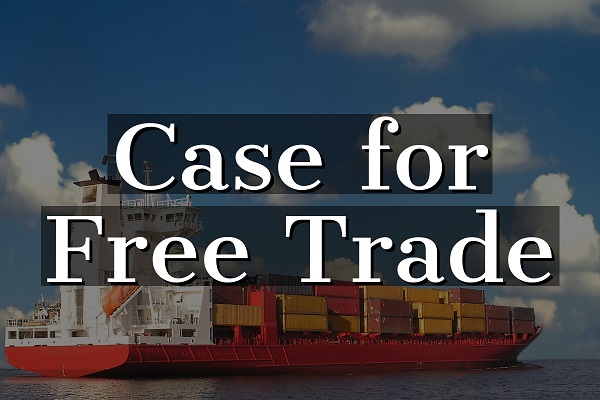Case for Free Trade –
1. Gains in Output and Well Being From Specialization –
The free trade is fundamentally based on the gain in output and well being a country gets from specializing in the production of those goods in which it is relatively more efficient and exporting those products to other countries in exchange for other goods in production of which they are comparatively less efficient.
Specialization and trading would achieve a more efficient allocation of resources and a higher level of output and well being.
Prof. Haberler, ‘International division of labour and international trade which enable every country to specialize and to export those things which it can produce cheaper in exchange for what others can provide at a lower cost, have been and still are one of the basic factors promoting well being and increasing national income of every participating country’.
2. Gains from Economies of Scale –
International trade enables the trading countries to benefit from the economies of scale. If a country does not trade with other countries, then its firms will produce goods to meet the domestic demand for a product. If domestic demand for a product is small, then the production cost will be high because they will not be able to get the benefits of economies of large scale production and the production will be inefficient. Trade allows a country to export goods and helps to achieve a higher level of output at the lowest cost per unit. Trade expands the market for goods and enables the producers to take advantage of the economies of scale.
3. Long Run Dynamic Gains –
Free trade also provides long run dynamic gains to the countries. Dynamic gains from trade mean its stimulation to economic growth.
Dennis Robertson described foreign trade as ‘an engine of growth’.
Free trade promotes economic growth in three ways –
a) Raising rates of saving and investment –
Increase in the national product or real national income through trade leads to a higher level of saving. The higher level of saving leads to a higher level of investment and capital formation which stimulates growth.
b) Import of capital goods –
Trade permits a country to import capital goods in exchange for exports of consumer goods or surplus raw materials which accelerates the industrial growth. Import of capital goods adds to the capital stock in country and raises its productive capacity more than it would have been possible without free trade. Free trade also enables a country to borrow from other countries to finance imports of capital goods.
c) Transfer of technology –
Trade increases international expansion of technology and transfer of technology from the developed countries to the developing countries have been possible. In the modern times technology developed in one country by a firm is licensed to firms in other countries which helps in further advancements in technology. By this process, technology is transferred from one country to other countries. In the absence of trade between countries this type of transfer of technology would not be possible and as a result economic growth will be slower.
4. Promotes Competition and Prevents Monopoly –
5. Political Gains from Free Trade –
